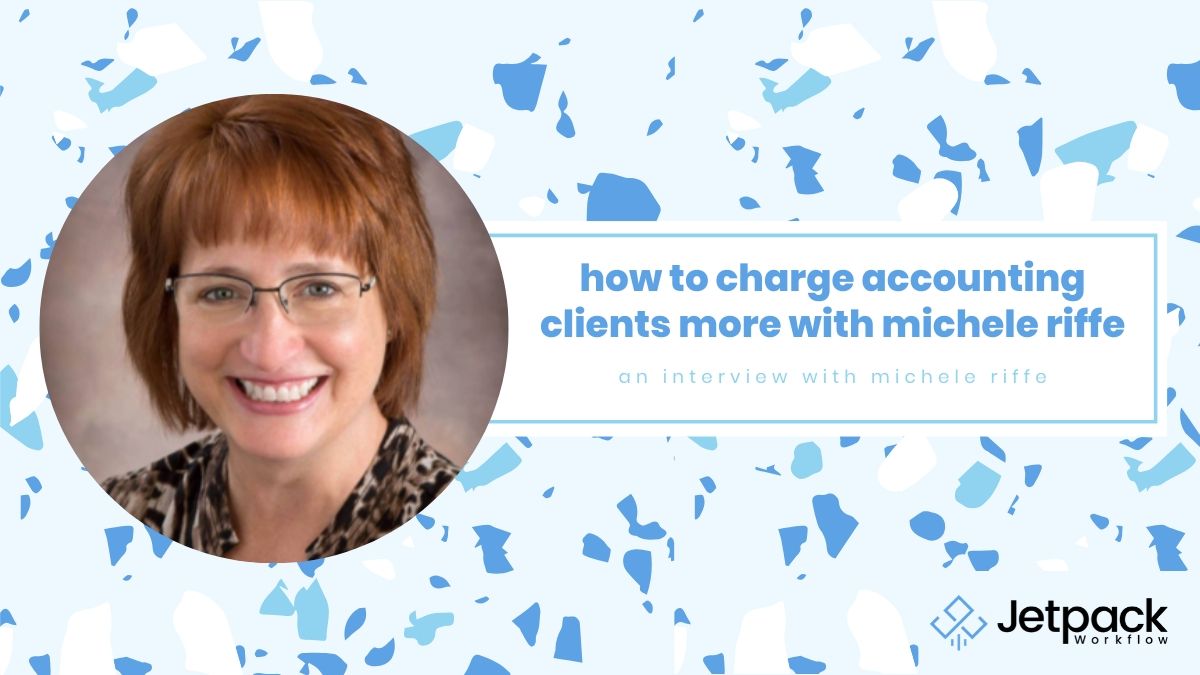How To Charge Accounting Clients More With Michele Riffe

In this world we live in, the value you put on yourself largely dictates the value others assign to you. If you’re looking to get paid more and land higher-paying clients, you may need to take a step back and analyze your mindset.
In this episode, Michele Riffe of Sherwood Financial and micheleriffe.com talks about how she thinks about value pricing over the classic hourly paradigm. We also see why she hasn’t tried to grow out a large company with an army of employees under her, even though she has landed large enough clients to justify such steps.
In this episode, Dave and Michele talk about:
- How Michele got into Value Pricing
- Her influences, both people and books
- How to ask for more
- Why Michele doesn’t have a huge team of employees
Resources About Michele:
https://sherwood-financial.net/
https://micheleriffe.com/
https://www.facebook.com/michele.riffe.5
Resources About Value Pricing:
https://jetpackworkflow.com/value-based-billing-paperless-flat-cpa-firm-jason-blumer/
https://jetpackworkflow.com/how-to-implement-value-pricing-with-jason-blumer/
https://jetpackworkflow.com/how-to-implement-value-pricing-with-ron-baker/
https://jetpackworkflow.com/charging-enough-for-your-accounting-services-mark-wickersham/
https://jetpackworkflow.com/tag/value-pricing/
Think Deeply about Value and Your Goals
How much should accountants be paid? Is there a universal hourly rate? Should large businesses pay more for their accountants than small businesses do?
These are the kinds of questions both clients and the accountants that serve them think about on a regular basis. Setting the right pay is an ongoing struggle for many.
Enter value pricing, a different way to think about pay.
What if you charge, not for an hourly rate, but for the solution to a client’s problem? What if you identify the major pain points a certain client is concerned about and put a price tag on solving those particular problems?
We’ve talked about value pricing a few times on this show in the past. In the links above, you’ll find links to our interviews with Jason Blumer, Ron Baker, and Mark
Wickersham, as well as our complete “value pricing” category, where you can find even more information on this fascinating topic.
For Michele, there isn’t a single value-pricing strategy that applies to all clients or situations. Instead, she chooses to cherry-pick from among several leading philosophies, choosing the best strategy for each client. This keeps her flexible and able to help a variety of clients.
How to Charge More
You may be wanting to charge more for your services as an accountant. But how do you manage it? How do you prove to others that you are worth more per hour than the next accountant?
You don’t.
Because thinking in terms of worth and hourly rates is a race to the bottom. Filing paperwork is a commodity, and there is always someone out there that is just as good that can do what you do for less money.
That means you have to stop thinking of yourself, and selling yourself to others, as a commodity. Instead, be a problem solver. Be a solution.
Tasks are cheap. Solutions are worth much, much more.
When you look in the vast world of Corporate America, as Michele Riffe has, CFOs get paid much more than accountants. They don’t get paid by the hour; they get a salary.
Why? Because what they offer large companies and corporations isn’t a list of tasks. They provide unique solutions to company problems. They provide a philosophy, an attitude that will change the course of the company.
When you pitch to new clients, you can choose to think and act more like a CFO than an accountant. You can simply say, “This service is worth this much to your company. So that’s what I want to charge you.”
The secret is in the sell.
And, as Michele puts it, that requires you to have a great deal of confidence when you walk into that meeting. If you aren’t sure of your worth, if you haven’t carefully prepared for your ask, then, when you have to put a price on your services, you’ll give yourself away.
As Michele describes it, you have to give that price tag with a straight face. You have to mean it.
And you have to know that you can follow through on what you are promising the client.
With that confidence, you’ll land much larger clients than before.
This isn’t to say you’ll land everybody. Many clients still think of accounting as a commodity, and that’s okay. They aren’t the right client for you, so you move on.
Should You Build a Large Team?
The goal of many firm owners and independent accountants is to one day expand their business to include a team of multiple employees, perhaps dozens of people. And then you’d need the physical office, the infrastructure, the organization and meetings and insurance, and so on. That is a very large goal to have!
Of course, if you actively want to build and grow and hire, there is nothing wrong with that goal, as long as you are sure that’s what you want.
Sometimes, Michele points out, people hire new employees because they feel they have to. They feel overwhelmed with work, for example, so they make their first hire. But
if that first employee isn’t trained well to work in sync with you, they may also be overwhelmed in a short time, leading you hire again and again. Before you know it, you have an extensive team, and much of your time is now spent in hiring and firing, training and managing. Unless you really dream of doing those things, you may end up feeling stuck.
The alternative? Make the conscious decision not to grow simply for the sake of growing.
Michele has outsourced contract workers on an as-needed basis, people that can help her do things she doesn’t specialize in. But since these people aren’t employees,
Michele’s business doesn’t needlessly grow.
The lesson: Grow your business (or don’t) purposefully. Don’t hire unless you need to.
There are many more fascinating points Michele and Dave made in this episode, but you’ll have to give it a listen yourself to get everything!
RELATED LINKS:





